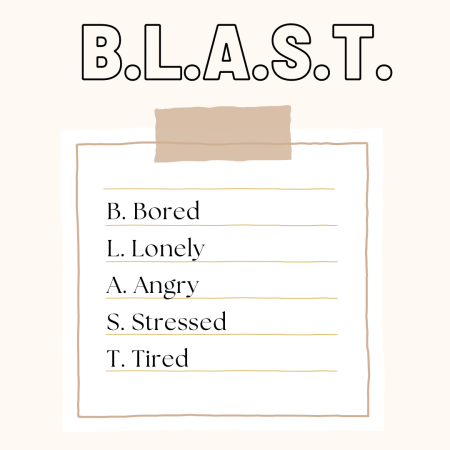B.L.A.S.T. Acronym - When Men are Vulnerable
By Jimmy Sliwa

The most common question in a job interview is “what’s your biggest weakness?“
What a deep question!
Your future employer clearly wants to know when you are most vulnerable to make mistakes.
I don’t care who you are, all men (including faithful husbands) have moments of vulnerability. Why else do scandals exist?
And just because you have a happy marriage and beautiful wife does not make you immune to outside pressure. Money, lust, greed…you name it, the devil has a temptation for you.
The reality is, we all experience pressure and temptation. And if you are not careful, you could easily be the subject of a moral failure.
All it could take is a mere moment of weakness.

I can remember when the pastor of my church had an affair. As he walked through a long redemption process, he said a phrase that has forever stuck with me.
The point he was making is that sin is always lurking. If you have an unrestrained thought life, a moment of weakness can turn into full blown sin.
For married men, the sins that you should avoid at all costs is the 7 deadly sins of marriage. These are the sins that have a high probability of ending your marriage.
The 7 Deadly Sins of Marriage:
- Infidelity
- Debt
- Anger
- Addiction
- Workaholism
- Apathy
- Pride.
No one gets married thinking that it will end in divorce, but divorces happen anyway. And no one gets into marriage expecting discontentment, but dissatisfaction happens regardless.
How does this happen? This happens because all humans have weaknesses and vulnerability to sin.
The purpose of this post is to warn you on the 5 times that husbands are most susceptible to sin.
Heed this warning and do what it takes to avoid sin.
When Are Husband's Most Vulnerable to Sin
To help remember the 5 times that men are most vulnerable I created an acronym –
B.L.A.S.T.
- B. Bored
- L. Lonely
- A. Angry
- S. Stressed
- T. Tired
B.L.A.S.T. represents the times that men are weakest. It is from these states of vulnerability that bad intentions have an opportunity to brew.
Let’s break them down one-by-one
B.L.A.S.T. Acronym

B. Boredom
Boredom is more common than ever. Even with smart phones filling every void moment, men still struggle with feeling bored.
When men are bored, they may lack meaningful or engaging activities to occupy their time and minds. This lack of meaning can make men more susceptible to temptation.
Chronic boredom can lead to a sense of emptiness or dissatisfaction, prompting individuals to seek excitement or stimulation in potentially unhealthy or sinful ways. Without constructive outlets, such as hobbies, meaningful work, or positive social interactions, men may turn to behaviors that offer immediate gratification but are ultimately detrimental to their moral values.
Additionally, prolonged boredom can weaken self-control and decision-making abilities, making it easier to rationalize engaging in activities that may be morally wrong or harmful.
L. Lonely
When men are lonely, they may experience a sense of disconnection and emotional emptiness, which can make them more vulnerable to sin. Loneliness can amplify feelings of sadness, frustration, or longing. This leads individuals to seek solace or distraction in behaviors that offer temporary relief but may be morally off-limits.
The lack of meaningful social connections can also weaken a person’s sense of accountability and belonging, making it easier to rationalize engaging in activities that go against their values or beliefs. Lastly, loneliness can erode self-esteem and confidence, making it harder to resist temptation and make wise decisions
A. Angry
When men are angry, they may experience heightened emotions and a decreased ability to think rationally. Anger can cloud judgment and lead to impulsive or aggressive behaviors that are harmful to relationships.
In moments of rage, individuals may be more likely to act on their impulses without considering the consequences, leading to actions that may go against their moral values or beliefs.
Furthermore, anger can fuel feelings of resentment, bitterness, and a desire for revenge, prompting individuals to seek ways to alleviate these negative emotions, even if it means engaging in sinful behavior.
S. Stressed
This is a big one.
When men are stressed, they may experience a range of physical and emotional symptoms that can increase their susceptibility to sin. Stress can trigger feelings of anxiety, frustration, and overwhelm, leading individuals to seek relief in unhealthy ways.
The pressure to cope with stressors may lead to a breakdown in self-control, making it easier to give in to temptations that offer immediate gratification but are ultimately harmful.
Additionally, stress can impair judgment and decision-making abilities. This makes it more challenging to resist impulses and make choices aligned with your moral values. The combination of heightened emotions and impaired cognitive function can create a perfect storm for engaging in behaviors that one may later regret.
T. Tired
When men are tired, their physical and mental faculties may be diminished, making them more vulnerable to sin. Fatigue can impair judgment and self-control, making it easier to succumb to temptations that offer immediate gratification but may go against their moral values.
Additionally, when tired, individuals may be more irritable or prone to negative emotions, which can further weaken their resolve to resist sin.
The lack of energy and motivation that accompanies tiredness can also lead to seeking quick fixes or shortcuts to alleviate discomfort. Quick fixes are never the answer when it comes to making decisions.


